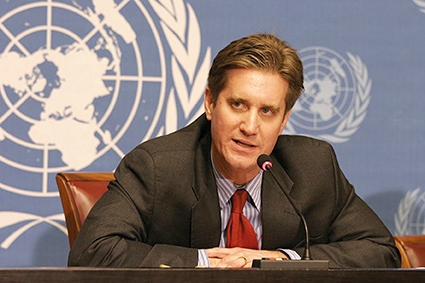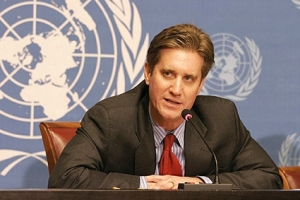Bryza on Senators McCain & Paul, 2008 & Georgia’s NATO, EU Future
EXCLUSIVE INTERVIEW
Ten Years – Remember the 2008 August War! might sound like film title, and it certainly was a season opener at the European Parliament this week. The event, organized by the European Conservatives and Reformist Group, was yet another reminder of the five-day war that took place in Georgia in 2008. Hosted by MEP Anna Fotyga, the speakers included, alongside former GT correspondent Zviad Adzinbaia, the former Deputy Assistant Secretary of State for European and Eurasian Affairs Matthew Bryza, whose name remains among the most recognizable in Georgia when it comes to foreign diplomats that dealt with our country. Mr. Bryza agreed to share with us his insights on the legacy of the 2008 August War and the US policy towards Georgia.
One of the most memorable quotes from 2008 would be Senator John McCain’s words- “Today we are all Georgian.” What is your assessment of his legacy and the importance when it comes to Georgia?
Senator McCain's legacy will be enduring and is one that motivated people like me at the time to realize that I had not lost my mind fighting so hard as we all were for Georgia's right to the self-determination of its own destiny; that we were not wrong about believing that the Georgian people had elected a president who was voted in on the idea of reunifying his country, even if elsewhere in the transatlantic community, people were uncomfortable that Georgia was standing up for its rights. Senator McCain was like the purist tone of a perfect bell ringing and reminding us we know what our values are, we need to stick by them; Georgians share them, and Georgians have every single right to the same democratic and market economic freedoms that we have and that the fight is a good one.
There's an ongoing petition to rename the Moscow district in Tbilisi to the Senator McCain district; considering we already have President Bush Street, it’s hardly unheard of. What do you think about it?
I think it's a beautiful idea. Senator McCain would probably feel a bit embarrassed but also immensely proud because he always felt he was fighting for what was not only morally correct but for what was in the US national interest. I think it's a great idea. I look forward to visiting it under its new name.
Not all senators are so friendly towards Georgia. Rand Paul objected to the sale of javelin missiles to Georgia and then requested the US make concessions to Russia and withdraw US support regarding Georgia and Ukraine’s NATO membership. What drives Senator Paul?
Senator Paul has quite a lot of unusual policy stances on many topics, often involving Russia. I don't necessarily see a conspiracy here, I see a senator who is a maverick in the opposite way to John McCain. McCain was known for being willing to move against the convenient truths of his party and confront the leadership when necessary, when he really believed in something. His belief system was internationalist, it was based on an understanding that the US is safer and more prosperous when its friends and allies are also safe and prosperous. Rand Paul's vision is the opposite, one according to which the US needs to look inward, care about itself and worry about maintaining good relations with the big players on the block while the little countries need to get out of the way and keep quiet: the big countries make the rules. It reflects a stance of American foreign policy that's always out there, which is isolationism. When George Washington was giving his farewell address, a very famous address indeed, he recommended that Americans in this new country avoid foreign entanglements and focus instead on building a strong country at home. I don't happen to agree with that trend, as I've always worked in the other direction that is still part of US foreign policy.
In a recent interview with Voice of America, you said there was insufficient contact with Russia regarding the red line that they should not have crossed regarding Georgia, though President Bush claims he was personally warned by Putin about Saakashvili being hot blooded
I know it was not enough because President Bush, whom I admire deeply, had not yet come to an understanding of what President Putin's goals were for Georgia. President Bush, alongside virtually all of his NATO counterparts, believed and wanted to believe that Russia was more like the rest of us than it really is; He wanted to believe that Russia shares our Western values and aspires to being a member of our community when in fact neither of those things are true; so maybe if President Bush had a chance to do it over again with the knowledge of what happened in Georgia and what that led to in Ukraine, he might be quite a bit clearer in defining what the consequences would be if President Putin overstepped the line. The problem was that the United States had not formulated a clear set of policy options of what to do if Russia overstepped the line in Georgia.
In the same interview, you agree with then State Secretary Condoleezza Rice who repeatedly claimed that that US warned Saakashvili not to give in to provocations. Was Saakashvili so volatile that he did not see the reasoning?
No, I think we got it right at the very end, when we gathered in the White House and consulted with our NATO allies and then with the Georgian government on a new peace plan. This was in May 2008, when we realized that all of those urgings to President Saakashvili not to pursue the policies that he was elected for (he was elected in part to reunify Georgia), that urging him to be quieter and more patient, had left Georgia and him in an impossible situation where he had to choose between either acquiescing to the loss of sovereign Georgian territory and potentially the loss of Georgian independence and his country’s place as part of a transatlantic community, or go to war with Russia. And so at the end, what we were hoping for was more time to try to work on that diplomatic plan and we ran out of time, largely because Russia provoked President Saakashvili into a military conflict. I will go to my grave believing it was the Russian side that shot first, that it was actually the so-called South-Ossetian forces shooting over Russian peacekeepers which made Georgia finally respond. But what president in the world would not respond to his own sovereign territory being attacked by separatists or by anyone else?
What do you think about the narrative supported by some that the war was actually started by Georgia?
I think anybody who has observed how Russia conducts its war in Ukraine should realize that Russia was at war with Georgia, an undeclared war, for years leading up to 2008. It had conducted information warfare, deadly intelligence operations, assassinations, and had taken steps that undermined the authority of the Georgian government and elevated the authority of the separatist leaders. If you look at the Russian doctrine of nonlinear war, hybrid war, you will see that the Russian concept of war is really one of constant international competition and conflict and one in which you use every tool of statecraft, of the economy, humanitarian aid information warfare, and you only use military force as a last step, often in a concealed way and often in the form of peacekeepers. That's what Russia did in Georgia, but it did it over the course of many years; so the fact is that the war did not begin when the first volleys of artillery were fired from the Georgian side, it is simply a fact that war had been going on for years already but it was undeclared and initiated by Russia.
Were the warnings given by the West to President Saakashvili and his government giving green lights to Russia to go ahead with their plans in the belief that Saakashvili would end up the scapegoat?
I think it was a mistake and I made my views known at the time, I had my orders, but you can draw a line from the transatlantic community's failure to stand with Georgia, including at the Bucharest NATO summit, to Russia's invasion of Ukraine and annexation of Crimea. Every sign that was sent was that “you can get away with this, President Putin, so just push a little bit more.” I like to recall that as late as summer 2014, after Russia had already invaded Crimea and the rest of Ukraine, after it had already occupied Crimea, the French government was still planning to sell Mistrals to the Russian side. That was a weapon that the Russian Deputy Chief of the General Staff back in 2008 had said “if we had this during the operations in Georgia, we would have been much more effective.” And this was in 2014! Six years after the war in Georgia and already after Russia had invaded Ukraine!
Has the West learned anything since the war in Georgia?
The West has learned its lessons at least with regard to Ukraine after what happened in Ukraine and now there are sanctions against Russia. Yes, there are new member states who would like to lift those sanctions, perhaps even President Trump would like to lift those sanctions, so there are plenty of leaders in the transatlantic community who did not learn their lessons, but I give credit to the Trump administration for at least in the case of Ukraine authorizing and facilitating the sale of Javelin anti-tank missiles, that was something our Bush administration did not do for Georgia. Had Georgia had such defensive weaponry back in 2008, Russia never would have moved into Ukraine subsequently.
And after learning those lessons, has the West has done enough regarding Georgia?
I don't know what “enough” would be. The West of course provided economic support right after the invasion of Georgia, made clear it stands with Georgia and Georgia's right to define its own strategic future, and repeatedly at NATO summits, NATO renews the Bucharest pledge that Ukraine and Georgia will become members of NATO. Now the point is that Georgia's destiny is in its own hands, much more than it was in the past; it's up to the Georgian voters to elect leaders who share their vision of transatlantic integration; Georgia is on this new Association Agreement path, visa-free travel to the European Union is a reality; so I think the West has done a lot; now it's going to be largely up to the Georgian people.
Georgia might be moving in the right direction, but is it closer to NATO and EU membership now than it was ten years ago?
It is closer in terms of cooperation, but not in terms of membership. The defining moment was indeed Bucharest 2008, and that was a red flag for President Putin; the decision meant that he’d better act quickly because eventually Ukraine and Georgia are going to get NATO membership. Even if NATO reaffirms that statement year after year, NATO's heart is not in it anymore. It’s best to worry less about NATO membership and worry more about being as close as possible to NATO and to the European Union: de facto integrate as far as possible and don't worry about the political battles being fought across the transatlantic political space.
By VAZHA TAVBERIDZE












